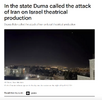Not sure I agree with him making a good case. Ritter, like others, has a history of exaggerating the impact and effectiveness of his chosen side's prowess. He has done this, for example, with Russia in Ukraine.
I think his claims about Iranian missile capability in this video are suspect because what he claims goes beyond what we have seen of Russian missile capabilities in Ukraine, and I think it unlikely that Iran has superior missile technology to Russia.
Yeah, this is the problem with assuming that two opposing sides, no matter how fervently each would
like to 'wipe the other off the map', ever really go 'all-in' with their strikes and counter-strikes. Ritter acknowledges that Iranian strikes were limited, but assumes that US-Israeli air defenses were 'dialed up to the max', and thus failed to stop all incoming missiles. But if Israel knew, either ahead of time, or once strikes had been launched, that the incoming objects were, say, without real or significant explosive warheads, or that they were targeted at the perimeters and remote sections of the runways of those two airbases, would they bother engaging all their air defense systems to ensure that every one of them is shot down mid-air?
As per Donald Trump, the Pentagon knew ahead of time in January 2020 that incoming Iranian missiles were aimed at "the perimeter" of the al-Asad airbase housing US troops in northern Iraq:
Having said that, it subsequently trickled out that many US troops at that airbase were injured with "concussion," so maybe one or two strikes were in fact closer than "the perimeter," and Trump was deliberately downplaying their danger to US personnel so that he and the US could 'save face'.
Ritter's right about one thing though: this counter-strike by Iran has 're-set' things in the region.
The airstrikes targeting Israel on Saturday night originated from four countries: Iran, Iraq, Syria and Yemen. This speaks to the level of coordination and commitment between those countries, and reinforces the raging paranoia in Israel that it is surrounded by a 'conspiracy of terrorists'.
The strikes, while symbolic and theatrical, were more of a 'win' for Iran and the Axis of Resistance than for Israel and the empire. The main thing the Iranians are happy with appears to be the precedent this sets for the next time(s) the Israelis strike/drone/assassinate anything Iranian, anywhere: rather than more words of condemnation, and maybe targeting of Israeli assets outside Israel (like they did in Erbil, northern Iraq, following the terrorist attack at Soleimani's commemoration in January), they'll just hit Israeli military infrastructure directly -
in Israel.
That threshold has been crossed, and now this dynamic of strike and counter-strike could go on for years, as we've seen in the former Ukraine, but the $64,000 question is, will the Israeli regime eventually accept defeat and a 'new reality', as Kiev is surely destined to, or, 'on its way down', will it 'go Samson' on as much of the region (or even the world) as it can?
Ukraine, unlike Israel, doesn't have secretly-placed nukes in foreign capitals, and aboard stealthy subs in the world's oceans...



